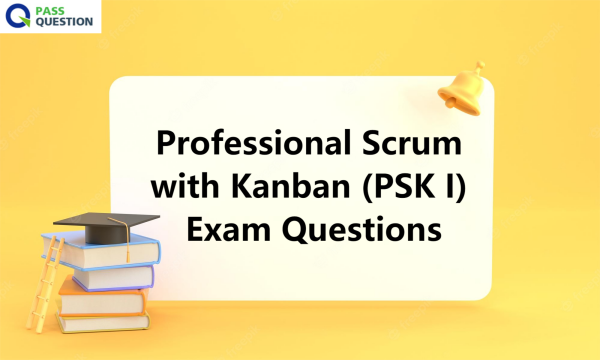Professional Scrum with Kanban (PSK I) Exam Questions
Are you attempting Professional Scrum with Kanban (PSK) exam? We are providing high-quality Professional Scrum with Kanban (PSK I) Exam Questions that will help you prepare for the Professional Scrum with Kanban level I exam. With the help of Professional Scrum with Kanban (PSK I) Exam Questions created by our experts, you will be able to pass Professional Scrum with Kanban level I exam with ease. Make sure to go through all the Professional Scrum with Kanban (PSK I) Exam Questions that you are receiving from us so you can strengthen your preparation level. With the help of our Professional Scrum with Kanban (PSK I) Exam Questions, you can easily pass PSK 1 exam on the first attempt.

Professional Scrum with Kanban (PSK I) Certification
The Professional Scrum with Kanban (PSK I) certification validates your knowledge of how Scrum Teams can use Scrum with Kanban to support value creation and delivery. PSK I ensures that you understand how Scrum Teams can use Kanban. PSK I also tests your ability to apply concepts from the PSK subject areas and in some cases, apply your own experience.
Certification Details
Fee: $200 USD per attempt
Passing score: 85%
Time limit: 60 minutes
Number of Questions: 45
Format: Multiple Choice, Multiple Answer and True/False
Subject Areas:
Understanding and Applying the Scrum Framework:
How Scrum and Kanban can be used together for greater benefit without compromising the core tenets of either Scrum or Kanban
Complementary Practices:
Kanban Practices
Knowledge of the Kanban practices listed in the Kanban Guide for Scrum Teams
Agile Metrics for Kanban
Knowledge of the required metrics listed in the Kanban Guide for Scrum Teams and how to use them effectively
View Online Professional Scrum with Kanban level I PSK-I Free Questions
1.Which of the following metrics will likely be reviewed by at the Daily Scrum for a Scrum Team using Kanban? (choose the best two answers)
A. Work Age Item.
B. Velocity.
C. Cycle Time.
D. Throughput.
E. Work in Progress (WIP).
F. Lead Time.
Answer: A,E
2.Which three statements best describe a Scrum Team's definition of "Workflow"? (choose the best 3 answers)
A. It helps management track a work item's percentage of completeness.
B. It provides a common understanding of when the Scrum Team considers work to be started and finished.
C. It describes how value flows through the system.
D. It creates transparency over policies related to Work in Progress (WIP) Limits.
E. It is used as a check off list for state that each work item must go through before it is considered 'done'.
F. It provides policies that create quality gateways between development handoff phases.
Answer: B,C,D
3.The definition of "Workflow" typically includes: (choose the best four answers)
A. The active states for the work items.
B. A shared understanding within the Scrum Team of how work is defined (work items).
C. A definition of customer value.
D. The start state of the process.
E. The finished state of the process.
Answer: A,B,D,E
4.How does Kanban support empiricism? (choose the best two answers)
A. The Kanban board provides transparency that helps the Scrum Teams inspect and adapt their process.
B. The Product Owner uses Kanban metrics to inspect the Throughput and adapt the Developers' Cycle Time accordingly.
C. Kanban prescribes specific practices that reduces the need for empiricism.
D. Kanban brings more rapid transparency about the product by enhancing and expanding the
practices of Scrum. This enables a more effective inspection and adaptation loop.
Answer: A,D
5. Kanban for Scrum Teams is built upon which Scrum Values? (choose the best three answers)
A. Focus
B. Transparency
C. Professionalism
D. Courage
E. Openness
Answer: A,D,E
- TOP 50 Exam Questions
-
Exam
All copyrights reserved 2025 PassQuestion NETWORK CO.,LIMITED. All Rights Reserved.

